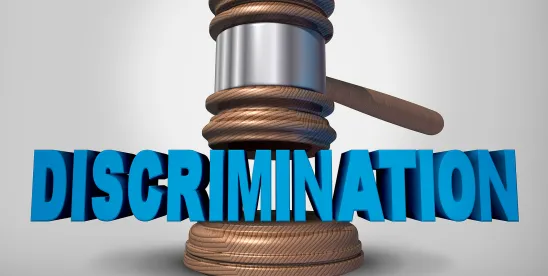The U.S. Equal Employment Opportunity Commission (EEOC) has made numerous changes in 2025 with respect to both personnel and priorities. On January 21, 2025, Acting Chair Andrea Lucas announced that one of the priorities of the EEOC’s compliance, investigations, and litigation is protecting employees from religious bias and harassment, including widespread campus antisemitism. Then, on February 19, 2025, Lucas announced, “The EEOC is putting employers and other covered entities on notice: if you are part of the pipeline contributing to our immigration crisis or abusing our legal immigration system via illegal preferences against American workers, you must stop… The EEOC is here to protect all workers from unlawful national origin discrimination, including American workers.” It is common for the EEOC to announce priorities in its investigations. It is believed by the current administration that the shift in the EEOC’s focus will help deter illegal migration, abuse of legal immigration programs, and anti-American discrimination through increasing enforcement of antidiscrimination laws against employers that prefer non-American workers.
If EEOC nominee Florida Assistant U.S. Attorney Brittany Bull is confirmed by the Senate, the EEOC likely will be able to move forward with enforcement of these new priorities.
EEOC Enforcement Priorities under the New Administration
The EEOC is tasked with administration and enforcement of civil rights laws against workplace discrimination. Pursuant to Title VII of the Civil Rights Act of 1964, as amended, the EEOC is comprised of five commissioners, including a chair, all of whom are political nominees. There must be at least three commissioners to have a quorum.
When President Trump was elected, many of those watching the direction of the EEOC did not believe much would change soon in terms of (1) issuance of new guidance, (2) revocation of formerly issued EEOC guidance, and (3) enforcement priorities because, due to the commissioners’ staggered five-year terms, it was believed that the earliest the EEOC could have a Republican majority would be July 2026.
Things have changed, however, since two Democrat EEOC commissioners were fired in January 2025. This was followed by the April 23, 2025, Executive Order “Restoring Equality of Opportunity and Meritocracy,” which announced that the EEOC would look at all pending investigations and lawsuits, including those under Title VII of the Civil Rights Act of 1964, that rely on the theory of disparate-impact liability and would seek “to eliminate the use of disparate-impact liability.” If current commissioner nominee Brittany Bull is confirmed by the Senate, the EEOC will have a Republican majority and a proverbial “green light” on its new enforcement priorities.
These new enforcement priorities, as set forth (above) by Acting Chair Andrea Lucas, include protecting employees from religious bias and harassment, particularly widespread campus antisemitism, and protecting workers from anti-American harassment and discrimination through a shift in focus of Title VII’s prohibition against national origin discrimination.
Lucas’s promise to hold colleges and universities accountable for rising antisemitism is part of a broader goal of many in government to protect Jewish students and employees from discrimination based on religion. For example, on March 18, 2025, Indiana Senator Jim Banks introduced the No Tax Dollars for Encampments Act, requiring colleges and universities to disclose their policies for responding to demonstrations, riots, and strikes. If enacted, this bill would potentially withhold federal funding from universities that do not adequately disclose or comply with policies for addressing civil disturbances.
In addition, on May 19, 2024, the Department of Justice announced that it will use the False Claims Act to identify and investigate recipients of federal funds that it determines allow antisemitism to thrive and promote Diversity, Equity, and Inclusion (DEI) policies. Indeed, the EEOC’s new priorities also include rooting out what it refers to as DEI-based discrimination. Its updated website describes DEI-based discrimination as occurring when DEI initiatives, policies, programs, or practices involve an employer taking an employment action motivated in whole or in part by an applicant’s or employee’s race, sex, or other protected classification. This focus on DEI extends to the religious discrimination context, as a rising number of employees are claiming that being required to comply with DEI-based initiatives violates their religious beliefs.
Religious Bias and Antisemitism
One such pending case involving claimed religious bias connected with DEI is an amended lawsuit filed in Kansas federal court in January 2025, under the caption Sullivan v. United School District 512 (24-cv-2491). In Sullivan, the plaintiff teacher alleges that her employment at the defendant public school system involved her being required to make statements and teach lessons that violate her religious beliefs. Specifically, in 2021, the plaintiff objected, in writing, to the school district’s required DEI training sessions and incorporation of DEI principles into her lesson plans, stating that they were racist, anti-White, and anti-American. The plaintiff was later disciplined for using a student’s incorrect pronouns and allegedly engaging in gender identity discrimination. In addition to alleging violations of Sullivan’s constitutional rights of free speech and free exercise of religion, the Sullivan complaint alleges that defendants violated Title VII and its prohibition against retaliation against individuals who oppose harassment based on race and/or color. How the pending Sullivan case is decided may have an impact on the outcome of several other similar lawsuits alleging violations of Title VII based on religious discrimination and opposition to DEI practices.
Another recent case involving similar issues is Brown v. Alaska Airlines, which was filed in U.S. District Court, Western District of Washington in 2022 (22-cv-668). In Brown, the two plaintiff flight attendants filed suit against Alaska Airlines, alleging that they were discriminated against because of their Christian religion after their employment was terminated for posting comments on the Alaska Airlines internal website, which the airline deemed violated its antidiscrimination and antiharassment policies.
The Brown lawsuit alleged several violations of Title VII, including religious discrimination/ disparate treatment, failure to accommodate religious beliefs, hostile work environment, and retaliation. The district court in Washington ruled in favor of the defendants, finding that they were protecting other employees from hearing offensive ideas, and that the flight attendants’ comments were not protected by Title VII because not all Christians shared their views and that they merely reflected general ethical principles. The plaintiffs have appealed this decision to the U.S. Court of Appeals for the Ninth Circuit (24-3789), where the case is currently pending. A decision on this appeal may signal how courts will review certain Title VII claims.
In addition to such lawsuits, the EEOC has been involved in seeking information about antisemitism. For example, in April 2025, it was revealed that faculty members of Columbia University and Columbia-affiliated Barnard College received text messages from the EEOC asking them to complete a survey inquiring about whether they are Jewish or Israeli. It was reported that on April 15 Columbia had sent an email to its employees advising it had received a subpoena from the EEOC “in connection with an investigation into alleged harassment of Jewish employees at the University from October 7, 2023, to the present.” It is believed that this EEOC investigation at Columbia is ongoing.
Anti-American Discrimination
As noted above, the EEOC is also shifting the focus of its national origin discrimination enforcement to discrimination against Americans. In February 2025, coinciding with Lucas’s press release regarding protection of workers from anti-American discrimination, the EEOC announced a $1.4 million settlement of a lawsuit alleging national origin discrimination against American workers. EEOC v. LeoPalace Guam Corp. (D. Guam) (25-cv-00004). In that case, the Guam-based hotel LeoPalace Guam Corp. was alleged to have discriminated against non-Japanese employees, including many employees of American national origin, in terms of compensation and terms and conditions of employment. In addition to the monetary relief of more than $1.4 million, the settlement involved injunctive relief including compliance monitoring, training, and reinstatement of former employees.
Potential Concerns Going Forward
Employers should be aware of these new enforcement priorities articulated by the EEOC and be ready to defend against such allegations. While these changes reflect a difference of priority at the federal level, it does not impact prior court precedent on existing state and local laws addressing discrimination. These new enforcement priorities also do not alter the existing case law that private individuals may pursue to address liability under Title VII for organizations. What a new EEOC priority may impact going forward is the number of governmental investigations of organizations on addressing anti-American bias and antisemitism. To aide in this effort, employers should consult with counsel about revising policies and procedures to ensure that requests for religious-based accommodations are carefully evaluated and that all workers are subject to the same employment conditions regardless of national origin.




 />i
/>i
